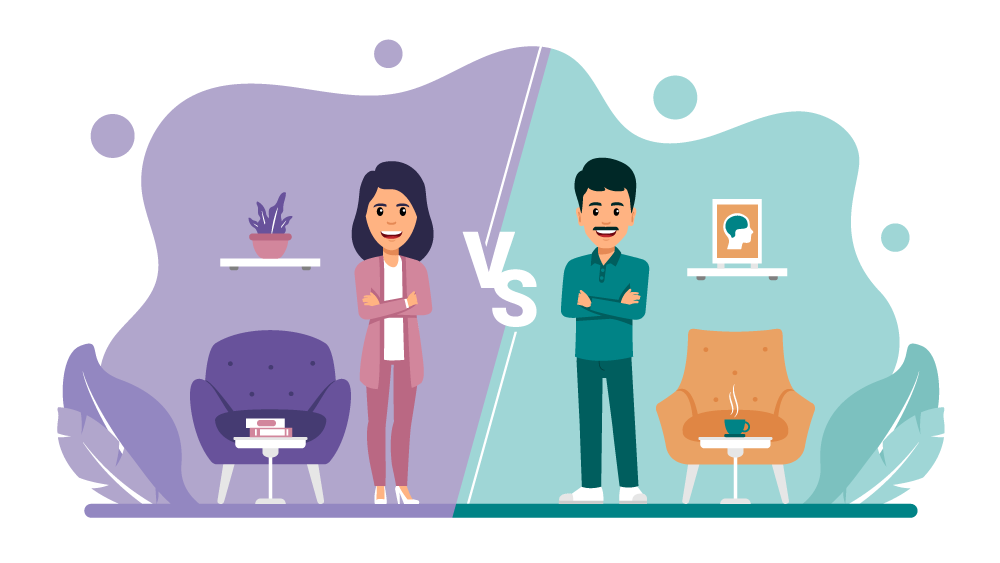When you’re trying to figure out which career is right for you, comparing a life coach to a therapist can help. These are two careers where you can help others, but they are rather different.
These two professionals will have similar skills. However, before you choose the right career for you, it’s important to look at both. Let’s compare a life coach to a therapist.

What is a Life Coach?
A life coach is someone that helps another person achieve their goals, whether personal or professional. They are not defined as healthcare professionals. However, many life coaches will have years of experience in a specific industry or area. They may even have a degree, but they are not healthcare professionals.
According to TonyRobbins.com, life coaching happens when “a client works with a coach who is not a healthcare professional to clarify goals and identify obstacles and problematic behaviors in order to create action plans to achieve desired results.”
What is a Therapist?
If you decide to become a therapist, you will become a licensed healthcare professional. Your job will be to help those with mental health conditions. You may also work with those that have gone through trauma.
A therapist will work with clients to identify complex emotions. These emotions may be connected to a significant life change, such as a death in the family.
Life Coach vs Therapist: The Differences
When you start looking into these two careers, you’ll notice quite a few differences. While life coaches and therapists do have similar skills, they are very different careers. Here are a few of the key differences between the two.
Education
If you want to become a life coach, you will likely earn a certificate online. However, there is no formal education required to call yourself a life coach and start working in this career. Sometimes, life coaches have degrees and experience in a specific industry. Other times, they earn a certificate online, which takes a few months.
Becoming a therapist will require at least a bachelor’s degree. Often, you will need to get an advanced degree to work in specific specialties. The education requirements for a therapist vary based on the type of therapy. Common types include:
- Mental health counseling
- Behavioral counseling
- Psychology
- Family counseling
- Substance abuse counseling
- Marriage Counseling
If you decide to go into psychology, you will need a doctorate degree. Other therapy specialties may require a master’s degree or specific certification.
Job Duties
Another huge difference you will find between a life coach and a therapist is their job duties. While both work with clients and help people, they do it differently.
- Life coaches motivate clients to achieve goals, while therapists perform psychoanalysis and offer emotional support
- Therapists help clients work through emotional issues, while life coaches advise clients on the course of action to achieve their goals
- Life coaches often speak to larger audiences much like a motivational speaker
- Therapists tend to work only one-on-one or with smaller groups
- Life coaches use motivational techniques, while therapists offer programs and resources to support clients
- Therapists work with those suffering from mental health issues, substance abuse, and struggling in their relationships
- Life coaches tend to work with people trying to achieve specific personal or professional goals
Annual Salary
A huge difference you will find between a life coach and a therapist is the annual salary. If you decide to become a life coach, you will enjoy an average salary of about $46K per year. You might earn more, if you decide to work for yourself, however.
Therapists tend to earn a much higher average annual salary. According to Indeed.com, the average salary for a therapist is about $73K per year. This salary can be much higher with the right employer or with the right specialty, as well.
The Work Environment
It’s common for therapists and life coaches to work in an office type of environment. However, many therapists will also do quite a bit of research. They may work in a research environment often.
Life coaches may also visit clients in their homes or work in a more public environment. They might give speeches and hold panels with other coaches and professionals. Some may also work in a broadcasting environment by providing a radio show, web series, or podcast.
Regulations
Life coaches are not regulated by a medical body. This is one of the reasons anybody can become a life coach without any education. However, therapists will need to comply and follow HIPAA guidelines. They will be regulated by a medical body.
Due to the regulations, it’s also common for an insurance provider to cover some therapy sessions. However, they will likely not provide any coverage for a life coach.
You must be licensed to work as a therapist. Since you will be a licensed healthcare professional, you have to earn the license and keep it. The licensing you need will vary, depending on the type of therapist you become.
A life coach doesn’t need to be licensed. However, it can be helpful to earn credentials through a certificate program. There are a few different options, which can give you the credentials you need to be viewed as a trusted coach.
Session Format
The format of a session with a life coach will be different than one with a therapist, too. Often, coaching sessions have a very clear structure. However, with a therapy session, the structure will be determined by the type of treatment.
It’s common for a therapist to start with a longer session, at first. This is an intake session. Then, the sessions will become more structured as you move forward. The structure will depend on the type of therapy needed.
Life coaching sessions will also start with a longer first session to gather information. The information gathered will include the goals of the clients, the obstacles they are facing, and their mindset. Subsequent sessions will be specifically structured to help guide the client toward their goals.
Both life coaches and therapists help others. However, they do it in a very different way. Choosing the right career means looking deeper at both options to figure out which one fits best for you.





